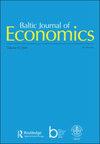Ragnar Nurkse and the international financial architecture*
IF 0.8
3区 经济学
Q3 ECONOMICS
引用次数: 3
Abstract
ABSTRACT This lecture discusses the work by the Estonian economist Ragnar Nurkse (1907–1959). It focuses on the early Nurkse, who was concerned with exchange rates, capital flows and what today we call the international financial architecture. It asks how many of the conclusions of International Currency Experience [Nurkse, R. (1944). International Currency Experience. Geneva: League of Nations.] survive. How many of Nurkse’s points about the interwar gold standard are confirmed by subsequent scholarship? How many of his points are still relevant to the international monetary problems of today?Ragnar Nurkse与国际金融架构*
本讲座讨论了爱沙尼亚经济学家拉格纳尔·努尔克塞(Ragnar Nurkse, 1907-1959)的工作。这本书关注的是早期的Nurkse,他关注的是汇率、资本流动以及我们今天所说的国际金融架构。它问有多少国际货币经验的结论[Nurkse, R.(1944)]。国际货币经验。日内瓦:国际联盟。]生存。Nurkse关于两次世界大战之间的金本位的观点有多少被后来的学术证实了?他的观点中有多少仍然与当今的国际货币问题相关?
本文章由计算机程序翻译,如有差异,请以英文原文为准。
求助全文
约1分钟内获得全文
求助全文

 求助内容:
求助内容: 应助结果提醒方式:
应助结果提醒方式:


